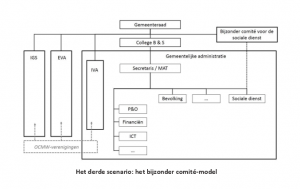Monthly Overview – June 2016
- Posted on August 11, 2016
- /Under Monthly Overview
- /With 1 Comment
BelConLawBlog publishes a selected reading list of (I) new scholarship on Belgian constitutional law in journals and books, (II) decisions of the Belgian Constitutional Court in which a violation of the Constitution has been found, (III) upcoming conferences, and (IV) calls for papers. In order to submit relevant developments for our monthly overview, please contact us.
This overview was composed by Juan Benjumea Moreno (academic assistant, UGent).
The two faces of counter-terrorism measures: fundamental rights and freedoms pressurized by counter-terrorism measures
- Posted on June 27, 2016
- /Under Analysis
- /With 2 Comments
Jasmine Rayée, Sophie Schiettekatte, Dorien Surinx, Judith Vermeulen (master students, UGent), Pieter Cannoot (assistant, UGent) and Dr. Jurgen Goossens (postdoctoral researcher, UGent)
 Following the Paris attacks in November 2015, the Belgian federal government issued a list of counter-terrorism measures to be implemented as a tool to combat the surge of terrorism threats. The proposals, depicted as necessary for the safety and security of the citizens, did not come as a surprise. An increase in anti-terrorism measures can be observed all over Europe and beyond, allegedly justified as part of a state’s obligation under international law to protect its citizens. However, some measures inevitably entail restrictions on fundamental rights and freedoms. Are we witnessing an unprecedented pressure on our fundamental constitutional rights? This post will analyse the effect of recent counter-terrorism measures on the right to privacy, the right to freedom and nationality in Belgium. While combating terrorism clearly constitutes a legitimate aim, it is necessary to analyze the proportionality, necessity and efficiency of some measures.
Following the Paris attacks in November 2015, the Belgian federal government issued a list of counter-terrorism measures to be implemented as a tool to combat the surge of terrorism threats. The proposals, depicted as necessary for the safety and security of the citizens, did not come as a surprise. An increase in anti-terrorism measures can be observed all over Europe and beyond, allegedly justified as part of a state’s obligation under international law to protect its citizens. However, some measures inevitably entail restrictions on fundamental rights and freedoms. Are we witnessing an unprecedented pressure on our fundamental constitutional rights? This post will analyse the effect of recent counter-terrorism measures on the right to privacy, the right to freedom and nationality in Belgium. While combating terrorism clearly constitutes a legitimate aim, it is necessary to analyze the proportionality, necessity and efficiency of some measures.
De keerzijde van de medaille: fundamentele rechten en vrijheden onder druk door anti-terreurmaatregelen
Jasmine Rayée, Sophie Schiettekatte, Dorien Surinx, Judith Vermeulen (masterstudenten, UGent), Pieter Cannoot (assistent, UGent) en Dr. Jurgen Goossens (postdoctoraal onderzoeker, UGent)
 In de nasleep van de terroristische aanslagen in Parijs in november 2015, heeft de Belgische federale overheid een aantal anti-terreurmaatregelen vooropgesteld om de terrorismedreiging in ons land aan te pakken. Een toename van anti-terreurmaatregelen kan worden waargenomen over het hele Europese continent en daarbuiten, in het kader van de internationaalrechtelijke verplichting voor elke staat om zijn bevolking te beschermen. We kunnen er niet om heen dat sommige van deze maatregelen onvermijdelijk inperkingen van onze fundamentele rechten met zich meebrengen. Staan we oog in oog met een ongeziene druk op onze grondrechten? Deze blogpost zal het effect van de recente anti-terreurmaatregelen op het recht op privacy, vrijheid en nationaliteit analyseren. Hoewel het evident lijkt dat de bestrijding van terrorisme een legitiem doel inhoudt, is het nodig om de proportionaliteit, noodzakelijkheid en efficiëntie van enkele maatregelen te analyseren.
In de nasleep van de terroristische aanslagen in Parijs in november 2015, heeft de Belgische federale overheid een aantal anti-terreurmaatregelen vooropgesteld om de terrorismedreiging in ons land aan te pakken. Een toename van anti-terreurmaatregelen kan worden waargenomen over het hele Europese continent en daarbuiten, in het kader van de internationaalrechtelijke verplichting voor elke staat om zijn bevolking te beschermen. We kunnen er niet om heen dat sommige van deze maatregelen onvermijdelijk inperkingen van onze fundamentele rechten met zich meebrengen. Staan we oog in oog met een ongeziene druk op onze grondrechten? Deze blogpost zal het effect van de recente anti-terreurmaatregelen op het recht op privacy, vrijheid en nationaliteit analyseren. Hoewel het evident lijkt dat de bestrijding van terrorisme een legitiem doel inhoudt, is het nodig om de proportionaliteit, noodzakelijkheid en efficiëntie van enkele maatregelen te analyseren.
Monthly Overview – May 2016
- Posted on June 23, 2016
- /Under Monthly Overview
- /With 0 Comments
BelConLawBlog publishes a selected reading list of (I) new scholarship on Belgian constitutional law in journals and books, (II) decisions of the Belgian Constitutional Court, (III) upcoming conferences, and (IV) calls for papers. In order to submit relevant developments for our monthly overview, please contact us.
This overview was composed by Elien Verniers (research assistant, UGent).
Monthly Overview – April 2016
- Posted on May 17, 2016
- /Under Monthly Overview
- /With 0 Comments
BelConLawBlog publishes a selected reading list of (I) new scholarship on Belgian constitutional law in journals and books, (II) decisions of the Belgian Constitutional Court in which a violation of the Constitution has been found, (III) upcoming conferences, and (IV) calls for papers. In order to submit relevant developments for our monthly overview, please contact us.
This overview was composed by Elien Verniers (research assistant, UGent).
Kleur bekennen: ideologische balans in US Supreme Court en Belgisch Grondwettelijk Hof
- Posted on April 20, 2016
- /Under Analysis
- /With 2 Comments
Arne Cools, Cédric Labens, Liselotte Leenaerts en Manon Moerman (master studenten UGent), Jurgen Goossens (doctoraal onderzoeker, UGent) en Pieter Cannoot (assistent, UGent)
 De vraag wie Antonin Scalia, rechter in het Supreme Court of the United States (SCOTUS) zal opvolgen na zijn recentelijk overlijden, verhit al enige tijd de gemoederen in de Verenigde Staten. Er staat dan ook heel wat op het spel.
De vraag wie Antonin Scalia, rechter in het Supreme Court of the United States (SCOTUS) zal opvolgen na zijn recentelijk overlijden, verhit al enige tijd de gemoederen in de Verenigde Staten. Er staat dan ook heel wat op het spel.
Een nieuwe rechter binnen SCOTUS kan immers de ideologische balans binnen het Hof doen omslaan. In België is de benoeming van een nieuwe rechter in het Grondwettelijk Hof zelden een hot topic in het maatschappelijk debat. In dit blogbericht analyseren we de belangrijkste gelijkenissen en verschillen tussen het Belgisch Grondwettelijk Hof en SCOTUS inzake verschillende aspecten die betrekking hebben op de politieke of ideologische positie van de rechter. Hoe zijn beide instellingen samengesteld en hoe verloopt de benoemingsprocedure van de rechters? In welke mate hebben politieke en ideologische overtuigingen een waarneembare invloed op de besluitvorming van beide hoven? Ten slotte wordt de mogelijkheid en wenselijkheid onderzocht om, zoals in de VS, dissenting en concurring opinions in te voeren in het Belgisch Grondwettelijk Hof.
Ideological balance in US Supreme Court and Belgian Constitutional Court
- Posted on April 20, 2016
- /Under Analysis
- /With 0 Comments
Arne Cools, Cédric Labens, Liselotte Leenaerts and Manon Moerman (master students UGent), Jurgen Goossens (doctoral researcher, UGent) and Pieter Cannoot (assistant, UGent)
 Following his recent passing, the succession of Antonin Scalia, Justice of the Supreme Court of the United States (SCOTUS), has sparked heated discussions in the United States for some time now. After all, there is a lot at stake. A new justice within SCOTUS could shift the ideological balance within the Court. In Belgium, the appointment of a new judge within the Constitutional Court is seldom a hot topic of discussion. This blog post analyzes the main similarities and differences between the Belgian Constitutional Court and SCOTUS regarding various aspects of the political or ideological positioning of the judge. How are both courts composed, and what is the appointment procedure for judges? To what extent do political and ideological convictions have a visible influence on the decision-making process of both courts? Lastly, we will examine the possibility and desirability of introducing dissenting and concurring opinions in the Belgian Constitutional Court, comparable to SCOTUS.
Following his recent passing, the succession of Antonin Scalia, Justice of the Supreme Court of the United States (SCOTUS), has sparked heated discussions in the United States for some time now. After all, there is a lot at stake. A new justice within SCOTUS could shift the ideological balance within the Court. In Belgium, the appointment of a new judge within the Constitutional Court is seldom a hot topic of discussion. This blog post analyzes the main similarities and differences between the Belgian Constitutional Court and SCOTUS regarding various aspects of the political or ideological positioning of the judge. How are both courts composed, and what is the appointment procedure for judges? To what extent do political and ideological convictions have a visible influence on the decision-making process of both courts? Lastly, we will examine the possibility and desirability of introducing dissenting and concurring opinions in the Belgian Constitutional Court, comparable to SCOTUS.
Monthly Overview – March 2016
- Posted on April 12, 2016
- /Under Monthly Overview
- /With 0 Comments
Monthly Overview – March 2016
BelConLawBlog publishes a selected reading list of (I) new scholarship on Belgian constitutional law in journals and books, (II) decisions of the Belgian Constitutional Court in which a violation of the Constitution has been found, (III) upcoming conferences, and (IV) calls for papers. In order to submit relevant developments for our monthly overview, please contact us.
This overview was composed by Elien Verniers (research assistant, UGent).
Monthly Overview – February 2016
- Posted on March 16, 2016
- /Under Monthly Overview
- /With 0 Comments
Please remark our new, improved listing of decisions of the Belgian Constitutional Court in which a violation of the Constitution has been found.
BelConLawBlog publishes a selected reading list of (I) new scholarship on Belgian constitutional law in journals and books, (II) decisions of the Belgian Constitutional Court in which a violation of the Constitution has been found, (III) upcoming conferences, and (IV) calls for papers. In order to submit relevant developments for our monthly overview, please contact us.
This overview was composed by Elien Verniers (research assistant, UGent).
Integratie van het OCMW in de gemeente: het bipolaire model onder druk
- Posted on February 25, 2016
- /Under Analysis
- /With 0 Comments
Lisa Embo, Mathias De Potter, Ward Diependaele, Robin Verbeke (masterstudenten Grondige Studie Grondwettelijk Recht, UGent), Pieter Cannoot (assistent, UGent) en Juan Benjumea Moreno (assistent, UGent)
 De Openbare Centra voor Maatschappelijk Welzijn (hierna de OCMW’s) staan op het punt om structurele veranderingen te ondergaan. De OCMW’s gaan immers niet langer een aparte entiteit uitmaken op gemeentelijk niveau, maar zullen in de toekomst deel gaan uitmaken van het gemeentelijk organigram zelf, met een eventueel uitzonderingsrecht voor de centrumsteden. Dit is een van de doelstellingen van het Vlaams regeerakkoord van 2014. De integratie zou tegen 2019 een feit moeten zijn. Of men deze ambitieuze doelstelling zal bereiken, is echter nog maar de vraag, want nu al rijzen de eerste problemen omtrent deze integratie. Allereerst is het nog niet duidelijk geworden hoe de operatie juridisch zal verwezenlijkt worden. Dit en nog tal van andere vragen zullen het onderwerp uitmaken van talloze discussies in de Vlaamse regering, de lokale besturen en zeker ook op federaal niveau.
De Openbare Centra voor Maatschappelijk Welzijn (hierna de OCMW’s) staan op het punt om structurele veranderingen te ondergaan. De OCMW’s gaan immers niet langer een aparte entiteit uitmaken op gemeentelijk niveau, maar zullen in de toekomst deel gaan uitmaken van het gemeentelijk organigram zelf, met een eventueel uitzonderingsrecht voor de centrumsteden. Dit is een van de doelstellingen van het Vlaams regeerakkoord van 2014. De integratie zou tegen 2019 een feit moeten zijn. Of men deze ambitieuze doelstelling zal bereiken, is echter nog maar de vraag, want nu al rijzen de eerste problemen omtrent deze integratie. Allereerst is het nog niet duidelijk geworden hoe de operatie juridisch zal verwezenlijkt worden. Dit en nog tal van andere vragen zullen het onderwerp uitmaken van talloze discussies in de Vlaamse regering, de lokale besturen en zeker ook op federaal niveau.


